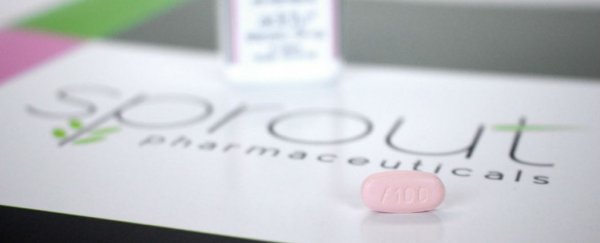The first prescription drug designed to increase a woman's sexual desire has been given approval by the US Food and Drug Administration (FDA), but with an unusual number of restrictions regarding who can prescribe it and how.
The manufactures of the pill, Sprout Pharmaceuticals, have been told that only doctors and pharmacists who have been specifically trained will be able to dispense and prescribe it, and they must keep a close eye on the patients and report any negative side effects. One of the main worries is that the pill, which will be marketed under the name Addyi, will be taken with alcohol, which can bring with it a heightened risk of sudden fainting.
Although it's now cleared its biggest hurdle, the drug will likely continue to court controversy, with some saying the product is neither particularly effective or safe, and others saying it represents a victory over gender bias at the FDA that's said to have delayed the approval process.
The drug has been rejected by the FDA twice before, and Sprout bought the rights to it from pharmaceutical giant Boehringer Ingelheim. A public relations campaign called 'Even the Score' followed the latest assessment by the FDA, claiming that men have access to an array of medications to treat sexual dysfunction, such as Viagra and Cialis, but until now, there was nothing on the market for women.
"This is the biggest breakthrough for women's sexual health since the pill," Sally Greenberg, executive director of the National Consumers League, said when the approval was announced.
But not everyone is so enthusiastic about the FDA's decision, which comes two months after the regulatory board officially 'backed' it. "Critics said the campaign behind Addyi had made a mockery of the system that regulates pharmaceuticals and had co-opted the women's movement to pressure the FDA into approving a drug that was at best minimally effective and could cause side effects like low blood pressure, fainting, nausea, dizziness and sleepiness," Andrew Pollack reports for The New York Times.
"This is a product that is neither very effective nor particularly safe," Susan Wood, a former FDA official now at George Washington University, told NBC News. "It won't benefit many women and at the same time the approval comes with a lot of restrictions, setting a precedent that a drug for women's sexual health has to be treated in a very special way."
The drug's been nicknamed 'the female Viagra', but it's actually nothing like the little blue pill for erections. While Viagra helps men keep and sustain an erection by directing blood flow to the penis, Addyi is designed to address the psychological aspect of sexual desire. Rather than being taken right before the big moment, as Viagra is, Addyi is taken daily, and over time is supposed to alter the levels of certain chemicals in the brain to assist with sexual desire.
It's not designed to act like an aphrodisiac or to assist women who aren't interested in their partner anymore, but to treat those who are afflicted by a condition known as hypoactive sexual desire disorder (HSDD). "Hypoactive sexual desire disorder is characterised by low sexual desire that causes marked distress or interpersonal difficulty and is not due to a co-existing medical or psychiatric condition, problems within the relationship, or the effects of a medication or other drug substance," the FDA says.
While the question of whether or not the drug was approved due to increased pressure on the FDA approval board, or if it deserves to be on the market to fill an important void despite its shortcomings, won't be easy to answer, it's probably best for now that it comes with such strict regulations. And if it gives some relief to women who are affected by HSDD where they previously had none, that's a good thing.
